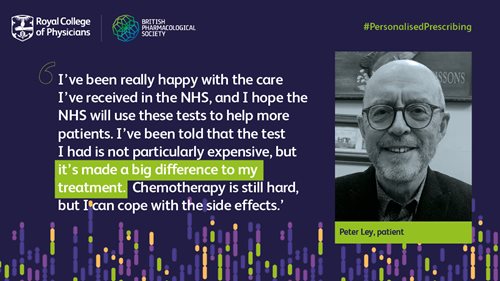
Peter is a 65-year-old retired civil servant who lives with his wife in Eltham, South London. He was diagnosed with colon cancer in 2017 and had an operation to remove part of his colon. Peter was told he would also need chemotherapy, however he suffered a serious reaction to his first round of chemotherapy. He was hospitalised with severe diarrhoea, spending 14 days in an isolation room.
Peter’s treatment was halted, and he was given a test to see if he had an altered form of a gene that is responsible for a liver enzyme called dihydropyrimidine dehydrogenase (DPD). DPD helps the body break down commonly used chemotherapy drugs, so people with altered forms of this gene can suffer serious side effects. The test showed that Peter did have an altered form of the gene.
Once Peter was feeling a bit better, he restarted his chemotherapy but with slightly different drugs and a lower dose.
In 2021, Peter learned that the cancer had returned in his abdomen and was treated with chemotherapy, radiotherapy and a second operation to remove his bowel, bladder and prostate. A recent CT scan showed that there were tumours in his lungs, and he is currently having a third course of chemotherapy alongside another anti-cancer drug called Cetuximab. Since having the test for DPD deficiency, Peter’s chemotherapy has always been adjusted to ensure that his treatment and its side effects are tolerable.
Peter says:
I’ve been really happy with the care I’ve received in the NHS, and I hope the NHS will use these tests to help more patients. Testing could give patient’s a better quality of life or a better treatment outcome. Life could be bit easier for patients if these tests help find the right treatment.
I’ve been told that the test I had is not particularly expensive, but it’s made a big difference in my treatment. Chemotherapy is still hard, but I can cope with the side effects, especially as a recent scan has shown that the tumours on my lungs are shrinking.
Read the full report
Read our new story about the launch of the report